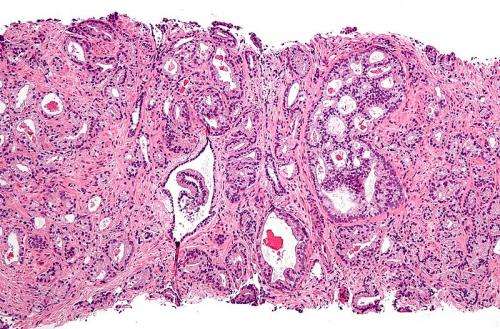Micrograph showing prostatic acinar adenocarcinoma (the most common form of prostate cancer) Credit: Wikipedia, CC BY-SA 3.0
Men with localized prostate cancer who received androgen deprivation therapy, a hormone treatment, were at significantly higher risk of heart failure than men who did not receive this therapy, according to a Kaiser Permanente study published today in the British Journal of Cancer.
In the past, androgen deprivation therapy has been used for advanced prostate cancer. Now, it is increasingly being used to treat prostate cancer in an earlier stage, before it has spread, which is often referred to as localized prostate cancer. However, the safety, risk and benefits of this therapy have not been established, said lead author Reina Haque, PhD, MPH, a researcher with the Kaiser Permanente Southern California Department of Research & Evaluation.
The goal of androgen deprivation therapy is to reduce levels of male hormones, called androgens, or to stop them from stimulating prostate cancer cells to grow. Androgen deprivation therapy can lower androgen to the same level as surgical castration within three weeks. This research, which looked at a large cohort of men with localized prostate cancer, suggests androgen deprivation therapy may be related to an increased risk of cardiovascular disease in this population.
The study found that for men with localized prostate cancer, androgen deprivation therapy was associated with:
- An 81 percent increased risk of heart failure in men without pre-existing cardiovascular disease
- An increased risk of heart rhythm problems for men with pre-existing cardiovascular disease, including a 44 percent increased risk of arrhythmia
- An increased risk (three times more likely) for men with pre-existing cardiovascular disease of developing conduction disorder, an interruption of the electrical impulses to the heart
"The implication is that patients with localized prostate cancer should be followed to minimize the health effects of androgen deprivation therapy on the cardiovascular system," Haque said. "Patients should consider lifestyle changes, and physicians should actively monitor the patient's health for early signs of heart disease."
Kaiser Permanente researchers followed a cohort of 7,637 men diagnosed with localized prostate cancer between 1998 and 2008 who were initially under "watchful waiting," which means they were being followed by a physician to gauge the progression of the cancer. Researchers followed them for up to 12 years after diagnosis. Nearly 30 percent were treated with androgen deprivation therapy. Many of the men were under the age of 60.
To determine the effect of androgen deprivation therapy on men with localized prostate cancer, researchers assessed a comprehensive set of factors including pre-existing cardiovascular disease, diabetes, hypertension, use of cardiovascular medications, smoking, body mass index and PSA levels. This allowed the researchers to account for the differences that could increase the risk of heart attacks, such as smoking, or previous cardiovascular disease.
"The findings allow men with localized prostate cancer to consider the positive and negative effects of androgen deprivation therapy and discuss it with their physicians," said Haque. "If they move forward with the therapy, patients should work with their physicians to adjust their lifestyle to reduce the risk of cardiovascular disease."
This study adds to previous Kaiser Permanente research aimed at improving men's health, including work developing a better health care delivery model for men with prostate cancer, and determining how a man's weight might affect his prostate cancer outcomes.
Journal information: British Journal of Cancer
Provided by Kaiser Permanente




















